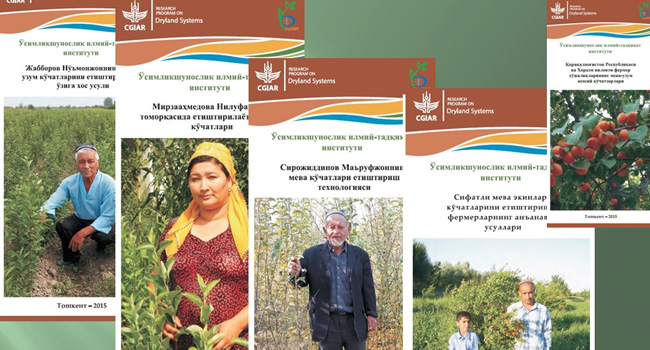
Since its founding in the late 1990s, one of the key priorities of the CGIAR Regional Program for Sustainable Agricultural Development in Central Asia and the Caucasus (CAC) has been maintaining the fruitful mutual cooperation with local research institutions, public organizations, universities, farmers’ associations and other groups of partners. In this regard, ICARDA and other CAC-based research centers work towards organizing various initiatives, including a range of knowledge-sharing activities. This article mentions some of the recent initiatives to share knowledge, which took form of workshops, seminars, training sessions, publications and field visits to distant provinces during the past month.
During 1-4 December, a training workshop on “Scientific management of field experiments” was held at Kashkadarya Research Institute of Grain Breeding and Seed Production in Karshi, Uzbekistan. The purpose of the course was to familiarize researchers, especially young researchers with principles and practices involved in conducting experiments, data analysis, and presentation and interpretation of results. Organized within the framework of the CGIAR Research Program "Dryland Systems", it was attended by fourteen young researchers who were involved in practical exercises on data collection, tabulation and computer entry. They studied different steps of scientific experiments and ways to minimize experimental errors and had an opportunity to make field visits to observe and understand different designs specifically used in wheat experiments.
On 8 December International Potato Center (CIP) and USAID supported a seminar within the project “Potato production support and research to improve food security in Khatlon” held in Dushanbe, Tajikistan. The main purpose of the seminar was to analyze and present research data on local seed potato value chain assessment - identification of gaps and bottlenecks, the research that was conducted by CIP together with the local partner, the Institute of Horticulture and Vegetable Growing under Tajik Academy of Agricultural Sciences.
The study identified the potato value chain as demonstrating great potential to support the eradication of malnutrition in the country. Because potato is rich in micronutrients (iron and zinc), it can help to diversify diets and address the problem of child malnutrition that is prevalent in Tajikistan. This highly informative event was attended by more than 30 participants from the Government, national agricultural research institutes, and international organizations (GIZ, World Bank, Mercy Corps). Representatives from the Tajik Institute of Botany, Plant Physiology and Genetics, and from the Academy of Sciences also participated and contributed to the event.
On 18 December International Water Management Institute (IWMI) organized a policy dialogue on the topic "Improving soil and land degradation through licorice cultivation in Uzbekistan". The seminar was jointly organized with Gulistan State University and Tashkent Institute of Irrigation and Melioration, and hosted in the Conference Hall of the Institute. The workshop aimed at establishing an effective dialogue between researchers, farmers’ representatives and policymakers, including members of Oliy Majlis (Parliament) and the State Land Reclamation Fund. It also contributed to raising the awareness of the general public on the role of licorice in land reclamation in the territory of Uzbekistan.
IWMI’s research demonstrates that licorice cultivation is an effective livelihood option in the dry, degraded areas with high levels of soil salinity. To this end, the partners involved in the project have established partnerships with local universities and government agencies to identify abandoned and highly saline lands that can be allocated for licorice cultivation. With this in view, the seminar presented reports on the work done, with special attention paid to effective implementation and dissemination of research guidelines and methods of licorice cultivation. The agenda included a presentation by Tursunboy Avezov, farmer from Syrdarya province, who shared his successful experience of cultivating licorice in his household farm, which resulted in improved soil conditions and additional income.
Further engaging farmers into research on “Establishment of a seed system platform to supply farmers with a high quality planting material of temperate fruit trees” the team of Bioversity International prepared printed and electronic manuals and booklets specifically designed for farmers. It is the result of various expeditions to the remote farms in the Republic of Karakalpakstan and Khorezm, Uzbekistan, during which local farmers participated in training seminars, round tables, educational and practical courses. They were introduced to varieties of fruit crops resistant to the harsh environmental conditions; their main characteristics, biochemical composition, fruit seed structure, technologies allowing to multiply fruit and grape varieties, and methods for cultivating high quality seedlings. This research was conducted within the CGIAR Program on Dryland Systems.
The booklets are centered on the stories of more than 60 farmers engaged in fruit-growing. They share their practices and experiences in fruit tree and grape cultivation and management. It includes detailed accounts of some of the leading farmers of the country - how they grow fruit tree varieties, their usage of traditional and scientific fruit tree growing practices and technologies, their methods of soil preparation for planting fruit trees, post-harvest storage of fruits and grapes and other practical information.
Knowledge-sharing initiatives like these are beneficial for local institutions, farmers, and national and international researchers alike. They provide very useful feedback from the field for the further development of the CGIAR-CAC Regional Program. They help to support on-going research activities, extend essential knowledge base during training courses and seminars, reflect on the work done and set new objectives. In addition to gaining new knowledge, participants establish contacts and partnerships for future exchange of experience.